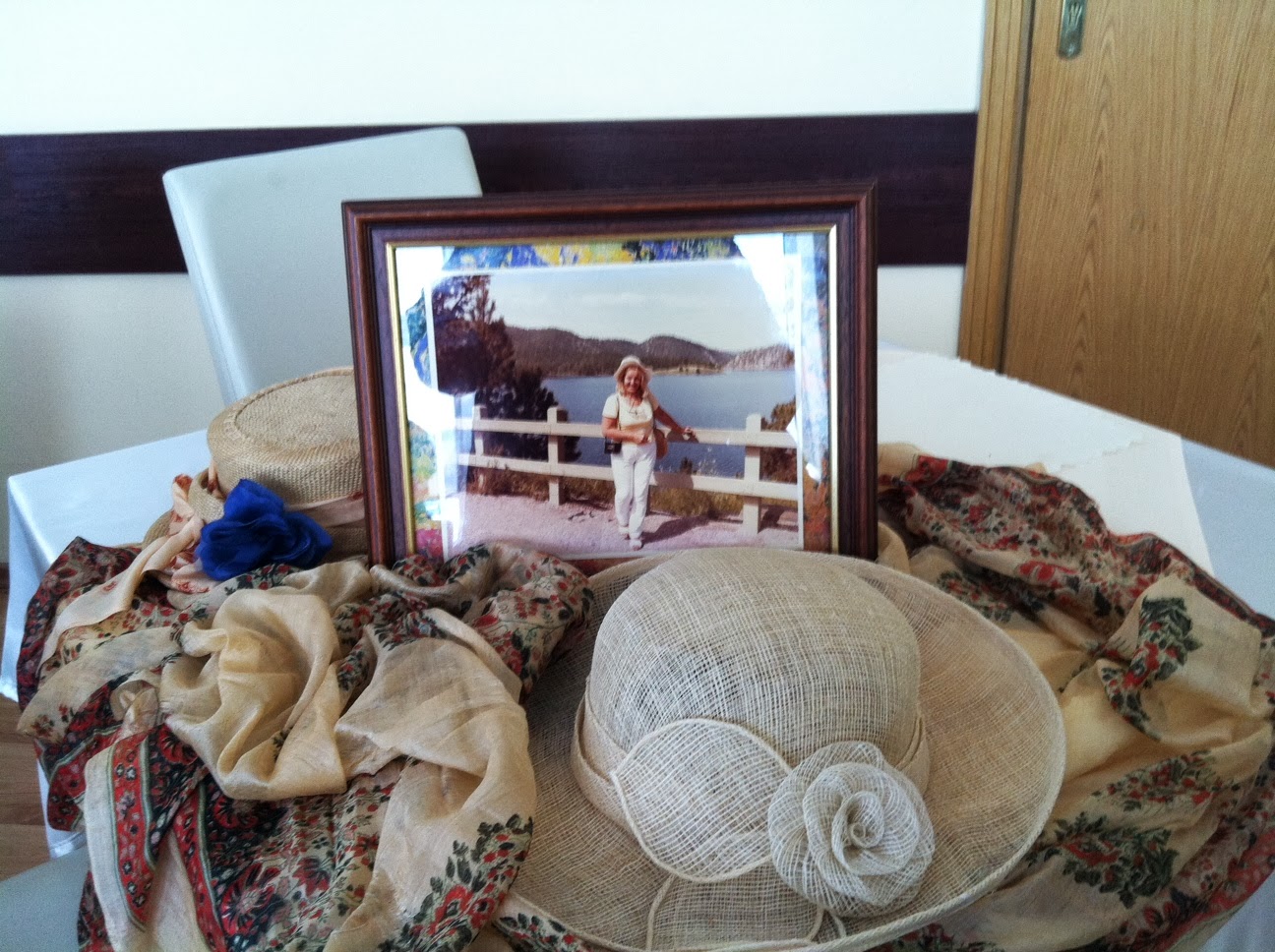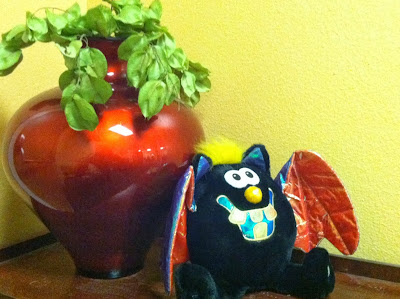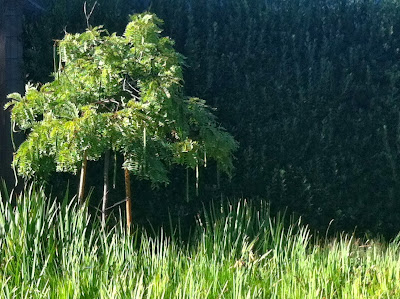Endre Dobay with Susan Dobay's painting Musicscape
The invitation said: "The versatile, talented, kind, compassionate, humble, husband of Susan, father of Vivian and Andrew, and the grandfather of Geoffrey and Mathew has moved to another dimension.
A mechanical engineer, a family man, and a supporter of all art forms which he respected and loved . With his wife artist Susan he was the proprietor of the Scenic Drive Gallery."
Portrait of Andrew by his mother, Susan, print by his father, Endre, with Jean Sudbury's violin
Photo by Maja Trochimczyk
Endre's prints of his wife's works and of the works by Kathabela Wilson were on display along with a selection of exhibition catalogues that he created for Susan. The artist also selected some family photos and those from among her paintings that were Endre's favorites. Guests brought flowers, poems and cards, some handmade, some carefully selected to express their appreciation for the many gifts of Endre, our Bandi.
The poetic and musical afternoon started with Jean Sudbury, violin, and Rick Wilson, Hungarian folk flute, performing a selection of music to set the audience in a nostalgic yet celebratory mood. Rick accompanied the poets throughout the reading, and Jean played more pieces that would have gladdened Endre's heart. Penelope Torribio accompanied herself on a guitar in two songs; Pauli Dutton sang away to the accompaniment of a red ukulele, and poets shared their reflections about this "kindest of men." Some of the poems are reproduced below, with permission of the poets, to honor the memory of a silent, thoughtful, and kind man, loved by all.
For dear Bandi, a Prelude
youngest boy
middle child of nine
sent to family
for the summer
when I grow up, he said
“I want to be a guest”
he was the best host
he welcomed us
with his eyes
took my face
in his hands and filled
our glasses with love
I send a thousand noisy kisses
out into the universe
for another hello
Bandi I could only write a prelude
an overture
to the opera you loved
an opening act of many
I wish to write for you
it is all we can do in this time of ours
our many beginnings--
there is no end to love
to this romantic story
how we are always only starting
to learn our lines
yours to us, ours to you
"we are so fortunate
to have you in our lives!"
~Kath Abela Wilson
your “Katika”
Endre Dobay
by Pauli Dutton
Susan’s mom started it all
when she noticed the young man
she asked him
you not like my pretty daughter?
why you not ask her to dance?
the handsome college boy
took the young beauty
in his arms
their waltz began sixty years
of acreativelove filled life
when she turned 19
Endre and Susan married
daringly the twoleft
their homeland to walk
across the Hungarian border
with other refugees they
took a train to Austria
the pair settled in the states
where Endre worked as
a mechanical engineer
Susan says Endre
could build anything
with her inspiration
they built a home
for their family and the arts
the Scenic Galley
has celebrated sculptors
photographers, writers
painters and musicians
while host Endre poured the wine
Susan was the motor
that kept Endre running
through every new
creative project
they complemented one other
Susan the artist found
loving support through Endre
photographer/printer
the sound wiz helped her create
new forms of media
their joint visual
interpretations of music
can now be enjoyed
by all on youtube
thanks to Endre
Endre we know you continue
to watch over Susan
as your love still fills the gallery
we hear your echo asking
would you like another glass?
Bandi and Susan listen to a reading by Just Kibbe, Monrovia, 2012
Bandi
camera suspended from his neck
gentle brown eyes search the room
to catch light and shadows
arrangements of colorful art
and us -- his friends
he had many
by Erika Wilk
Jean Sudbury, Kathabela Wilson, Endre Dobay and Maja Trochimczyk, 2012
The man I did not know
~ for Endre Dobay in memoriam
I did not know the boy –
That tall, serious teen, always reading
Books, or fixing bikes of local children
I did not know the man –
What happened?why he left his home
Who died? … I did not know
The man who fell in love, married,
had children – a son and daughter. . .
All in the new country, in a new house,
Nested on the slope of a magnificent mountain
Where bears wander down the streets
And take baths in neighbors’ swimming pools,
Where mocking birds, sing away tunes
Stolen from car alarms and clock chimes,
And birds sometimes sit quietly in the branches
Of the old hibiscus outside the kitchen window
Watching him work.
Yes, the charming one – his eyes spoke volumes
Even if his mouth did not move
Except for that hint of a smile in the corner –
Yes, I knew Susan’s husband
Silent, supportive, quietly amused
By the poets’ antics.
I knew Bandi of talented artist’s hands,
Deep philosopher’s insights. I remember him
Watching over us, filming dialogues,
Seeking goodness , beauty, truth –
Now he found it and we lost him for a bit,
Until we find our own goodness and beauty
In the everlasting truth – when we join him
In the light that draws us nearer
As it drew him into that brilliant column
Stretching straight up into heaven
Taking him higher, higher –
Into the constellation of the blessed
© 2016 by Maja Trochimczyk
Bandi and Susan attend my presentation at the Wilsons' salon, December 2011
I also read my poem inspired by Susan's painting "City Whispers" from the "Awakenings" project of Poets on Site. I got a print of that painting made by Bandi and it is on the wall in my house. The poem with an image of the painting, published in "On Awakenings" book edited by Kathabela Wilson is reproduced in my Easter 2011 post.
At the end, I read my participatory poem, "Repeat after me" with a revised ending. I reproduced the previous version of the poem on the blog from this spring, from a reading with Beverly M. Collins at Phoenix House. http://poetrylaurels.blogspot.com/2016/03/black-history-month-at-phoenix-house.html
Daffodils, tulips, roses and lilac for Bandi and Susan
Almost the last to arrive and the last to read was poet and light-giver Susan Rogers, who wrote out her poem on a card with a drawing of the tree, as strong and solid as Bandi was, an oak or a banyan tree with deep roots in the earth and the branches reaching out to heaven.
Poem by Susan Rogers, with her drawing of a banyan tree.
Collection of photos of Bandi assembled by Susan Dobay.
For more photographs from the Celebration of Life event visit my Picasa Web Album:
Finally, here's a report from the Celebration of Life assembled by
an artist and musician, Penelope Torribio and published on YouTube:
Poets at Madame Butterfly event at the Scenic Drive Gallery, with Mariko Kitakubo, Photo by Endre Dobay, 2014
Thank you, Bandi!















_opt.jpg)
.JPG)
.JPG)
.JPG)




.JPG)







.JPG)

